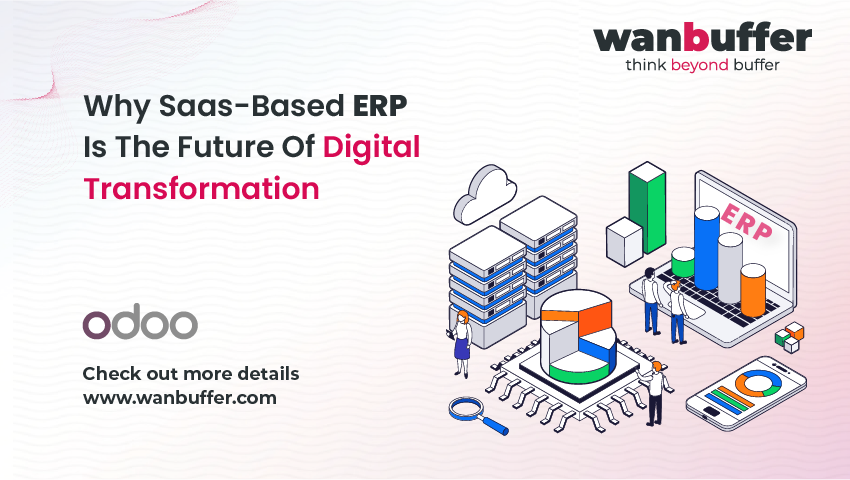
Table of Contents
1. Introduction
In a world where agility and efficiency are critical, businesses are embracing digital transformation like never before. At the heart of this transformation lies a powerful enabler: SaaS-based ERP (Enterprise Resource Planning) systems.
Unlike traditional ERP, SaaS-based ERP delivers cloud-native, scalable, and cost-effective solutions that allow companies to adapt rapidly in a competitive landscape. As businesses digitize operations, customer engagement, and supply chains, ERP software delivered through SaaS (Software as a Service) has become the go-to solution for modern enterprises.
2. What is SaaS-Based ERP?
A SaaS-based ERP is an enterprise resource planning system hosted in the cloud and delivered via a subscription model. It allows businesses to manage core operations—such as finance, HR, inventory, and CRM—without hosting software on-premise.
Key features:
- Access via web or mobile app
- Automatic software updates
- Subscription pricing model
- Scalable infrastructure
This model eliminates the need for costly hardware, lengthy installations, and complex upgrades—making it ideal for both SMEs and large enterprises.
3. The Driving Force Behind Digital Transformation
Digital transformation is about more than just adopting technology—it’s about reshaping business models for the digital age. SaaS-based ERPs enable this transformation by:
- Offering real-time data and analytics
- Enabling remote accessibility for hybrid and global teams
- Streamlining cross-departmental collaboration
- Supporting automated workflows and AI-driven decisions
Companies leveraging SaaS ERP experience greater agility, enhanced productivity, and improved customer experiences.
4. Key Benefits of SaaS-Based ERP Solutions
✅ 1. Cost Efficiency
- No upfront hardware costs
- Subscription-based pricing
- Reduced IT support and maintenance
✅ 2. Rapid Deployment
- Faster implementation than on-premise ERPs
- Scalable as your business grows
✅ 3. Automatic Updates
- Regular security patches and feature enhancements
- Always on the latest version
✅ 4. Enhanced Security & Compliance
- Cloud ERPs come with enterprise-grade encryption
- Meet compliance standards like GDPR, HIPAA, and ISO
✅ 5. Anywhere, Anytime Access
- Ideal for remote or global teams
- Real-time collaboration and reporting
Explore our guide to SaaS development
5. Real-World Applications Across Industries
SaaS-based ERPs are transforming industries across the board:
- Retail: Manage inventory, CRM, and POS systems in real time
- Healthcare: Ensure compliance and streamline patient records
- Manufacturing: Oversee supply chains and production scheduling
- Professional Services: Automate billing, HR, and project tracking
- Finance: Handle multi-currency accounting and regulatory compliance
With SaaS ERP, businesses can optimize workflows, reduce manual tasks, and make data-driven decisions.
6. Future Trends in SaaS ERP
SaaS ERP is continuously evolving with technological advancements. Key trends to watch:
- AI & Machine Learning – Forecasting, risk detection, and smart automation
- Low-Code/No-Code Platforms – Custom ERP workflows with minimal development
- IoT Integration – Real-time monitoring and automation in manufacturing/logistics
- Zero Trust Security Models – Enhanced user access control
- Mobile-First UX – ERP apps optimized for smartphones and tablets
These innovations will ensure SaaS ERP remains a cornerstone of digital strategy.
7. Conclusion
The future of enterprise operations is cloud-based, connected, and agile. SaaS-based ERP systems offer the scalability, flexibility, and cost-efficiency modern businesses need to thrive in a digital world.
Whether you’re a startup or an enterprise in growth mode, SaaS ERP can:
- Cut IT costs
- Streamline operations
- Support data-driven decisions
- Future-proof your business
🚀 Ready to transform your business with SaaS-based ERP? Contact Wan Buffer Services for tailor-made ERP solutions built on innovation and scalability.
8. FAQs
-
What is the difference between SaaS ERP and traditional ERP?
SaaS ERP is cloud-based and subscription-based, with no need for on-site hardware. Traditional ERP requires in-house infrastructure and has higher upfront costs.
-
Is SaaS-based ERP secure?
Yes. SaaS ERPs come with built-in security features like encryption, access control, and regular updates to ensure data safety.
-
Can I customize SaaS ERP for my business needs?
Absolutely. SaaS ERP solutions like Odoo offer modular architectures and APIs that support custom workflows and integrations.

